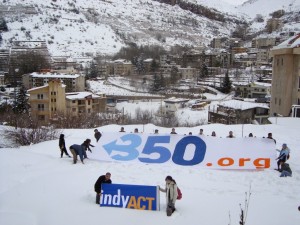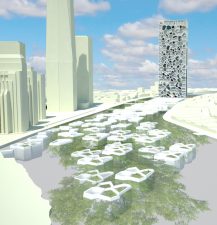 An architect in Beirut illustrates how a small splash of color can completely transform a concrete environment. But trust us, that is just the beginning of this city’s problems.
An architect in Beirut illustrates how a small splash of color can completely transform a concrete environment. But trust us, that is just the beginning of this city’s problems.
I judge a country by its public transportation, and Sandra Rashini, an architect who held a magnifying glass over Lebanon’s colossal urban problem for Mashallah, will tell you that it’s not looking so good in Lebanon. The consequences are enormous: everything – from agriculture to human health – is affected in the absence of good planning. Absolutely everything.
Alongside maybe Cairo (someone ought to do a comparison), Beirut in particular offers the best example of what can go wrong when cars and roads are allowed to overtake every inch of nature – both wild and fertile. The Gulf countries are working on a major overhaul of their public transportation systems. Jordan just shelved their good plans. What will Lebanon do?
Fantasizing about a sweeter Beirut
Sandra sent us a link to her blog Beirut the Fantastic, in which she explores a traffic problem that causes her and thousands of other normal, sentient people in Beirut to cuss and go mad. They can’t be blamed.
Between 1974 and 1998, there was a 538% increase in the number of cars on the road. Who knows how many cars there are now, but we get the sense that Sandra will find out. Meanwhile, during that same time frame, use of public transportation decreased from 9% of the population to a mere 1.3%.
Sudden, malignant, uncontrolled growth
That number is worse than it originally sounds since population density has exploded exponentially, and it hasn’t been orderly. Sandra explains in another blog post about urban agriculture that during the revolution, any attempt at urban planning completely fell by the wayside and violations of local regulations became a regular thing to do. As a result, all kinds of land that might otherwise have been used for agriculture or parks or more sustainable transportation routes was usurped by sudden, malignant, uncontrolled growth.
Today, roughly 35% of Lebanon lives in this crowded, polluted, loud, brown space.
A whole pile of money
The former Fulbright scholar notes that the average Lebanese family spends a whopping 13.85% of their income on cars – buying, fixing, and fueling them, amounting to 15% of the country’s GDP in 1997 (see what Arwa has to say about a green GDP in the Middle East) and a whole pile of money that would be better spent developing greener transportation alternatives ends up being used to treat the health by-products of this urban disaster – such as unhealthy levels of lead in the blood.
Rashini claims that light rail offers the best possible solution. An infographic published on Treehugger last week shows that in some situations, the electric car is a better option, but that’s not the case in the Middle East where that market is still the size of a single grain of sand in the middle of the Sahara, whereas the old-fashioned bus shows itself to be a consistently great alternative across the board.
Taking cars out of Beiru
Taking cars out of Beirut and making way for buses could quieten the city down, cut down on pollution, and allow urban planners to convert some of the city’s grey concrete into green spaces that also promote social cohesion. It’s not necessary to have a giant Central Park, according to Rashini. A series of small parks would be equally effective.
Will the Ministry of Transport take matters into their own hands? Do they have the funding? Will richer Arab countries step in to help, as the UAE did in Morocco, for instance, by helping to fund the revival of Asillah – a beautiful city that had been terribly neglected – into a world-renowned arts location? We certainly hope so.
:: Mashallah
Public Transportation Stories in the Middle East:
Jordan’s Ambitious Bus Plans Get Shelved
Middle East Joins Worldwide Campaign for Greener Transport
Beirut Activists Try to “Green the Grey” of their Urban Environment




For more images and plans regarding the proposal please find at the link below
http://spatiallyjustenvironmentsbeirut.blogspot.com/2011/10/get-me-out-of-this-traffic-jam.html
For the original proposal please find below http://spatiallyjustenvironmentsbeirut.blogspot.com/2011/10/get-me-out-of-this-traffic-jam.html